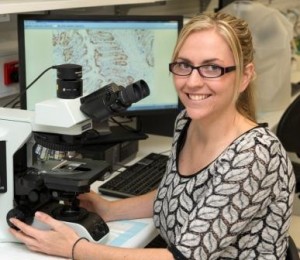In a world first, the team of scientists has generated preliminary evidence to show that red meat increases lesions on the DNA of the colon which, left unrepaired, could lead to mutations, raising the risk of colorectal cancer.
Now, the group is trying to find a way to correct this specific type of DNA damage by delivering resistant starch directly to the colon where it converts to short chain fatty acids, thereby reversing the damage.
"The body has its own system to repair these lesions but we’re not sure how much red meat tips this repair mechanism over the edge, making the individual more susceptible to mutations and cancer," PhD candidate Jean Winter, who is leading the study, said.
"What we do know is that resistant starch ferments in the colon and turns into short chain fatty acids, and these short chain fatty acids have been shown in animal models to reduce cancer rates.
"So what we’re trying to find out is whether eating red meat with resistant starch reduces the number of lesions and therefore the risk of cancer."
Using mouse models that are prone to colon cancer because they lack the genes to repair either the lesions or subsequent mutations, the researchers hope to confirm their theory that DNA lesions increase with red meat and that resistant starch protects against, or reverses, the damage.
Mrs Winter, who is also a research assistant based in the Cancer Prevention Unit of the Flinders Centre for Innovation in Cancer, said the ultimate aim of the study was to prevent cancer from the outset.
"Colorectal cancer is the second-most diagnosed cancer in Australia and we actually have the highest incidence of colorectal cancer in the world," she said.
"But it’s important to realise that colon cancer can be prevented through lifestyle, primarily diet, and if we can prevent cancer we don’t have to treat cancer, which is the ultimate goal."






-160x160-state_article-rel-cat.png)










